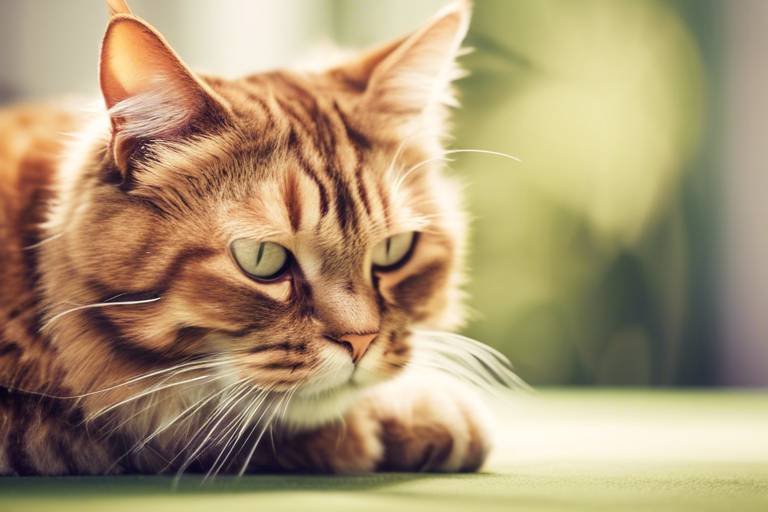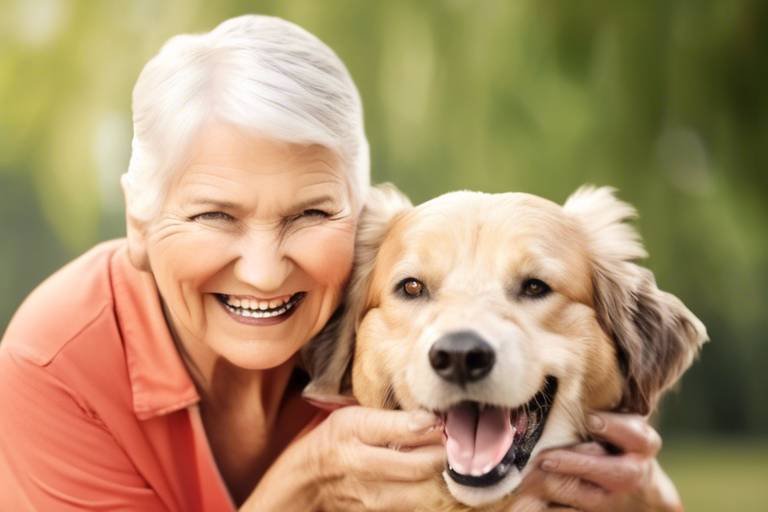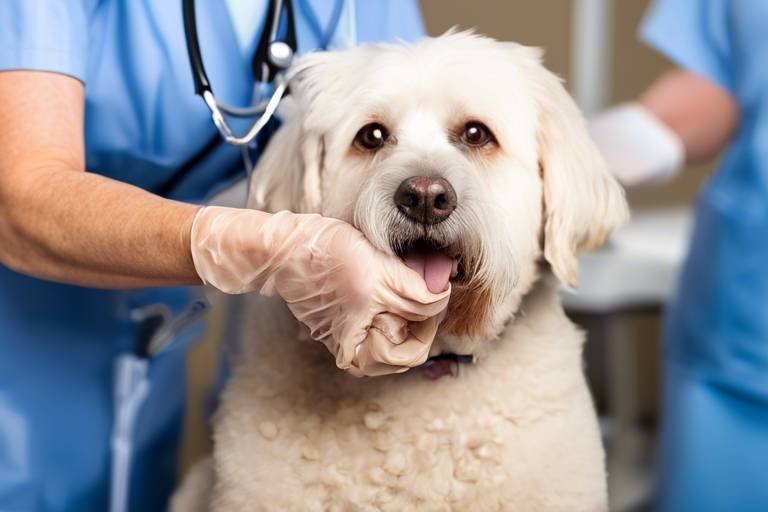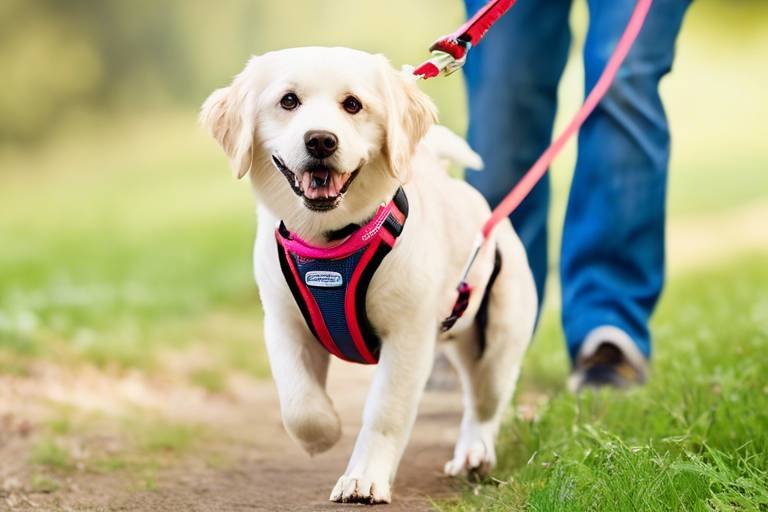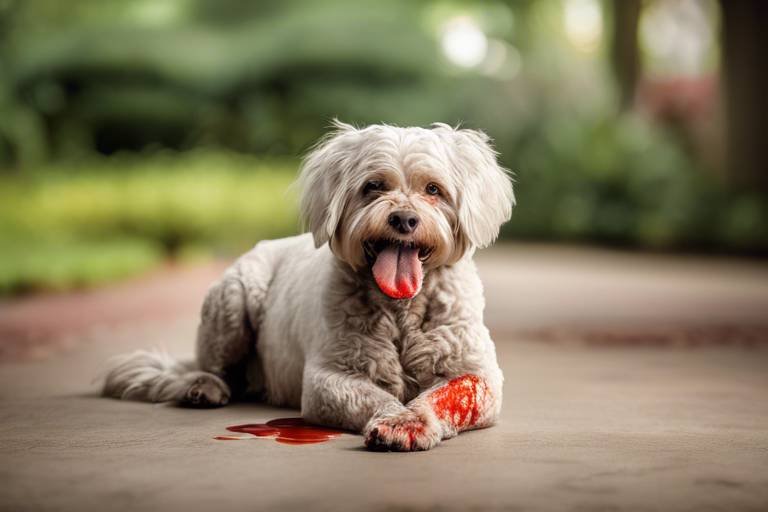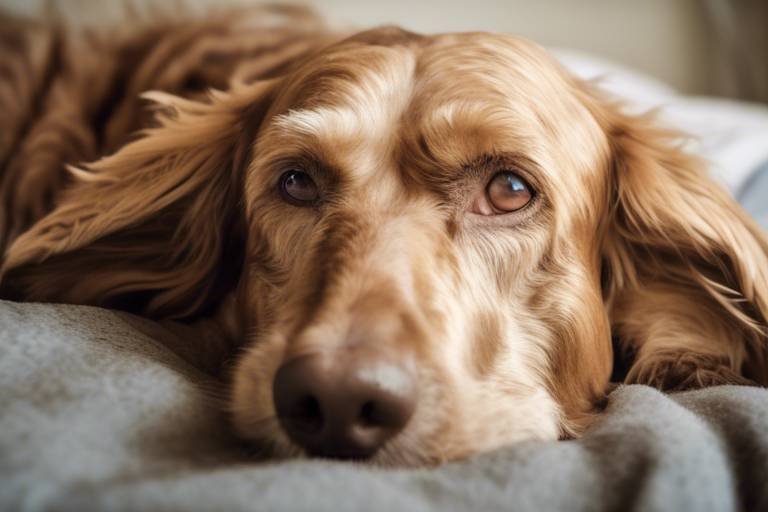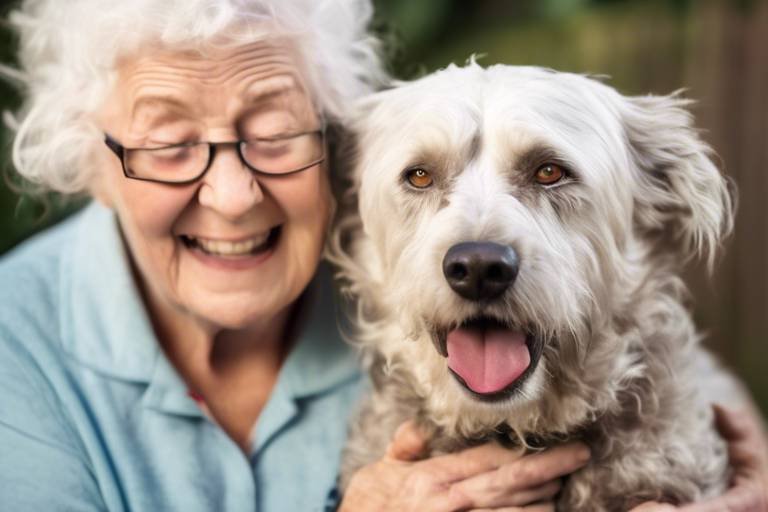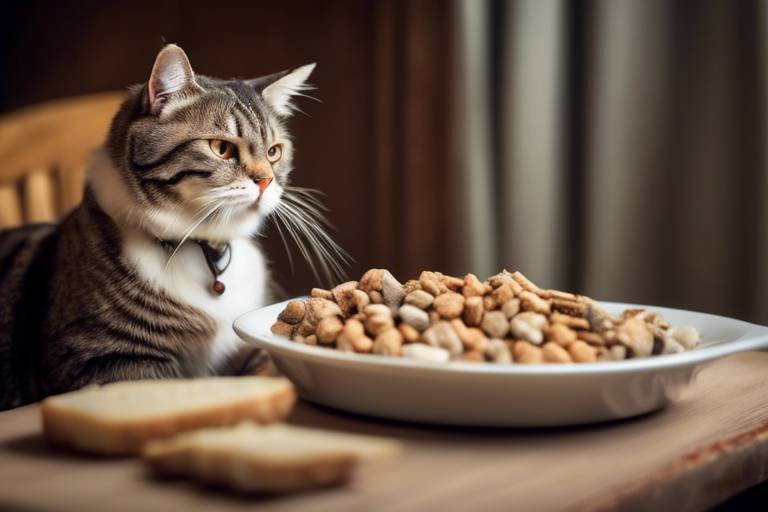How to Maintain Healthy Skin and Coat in Senior Pets
As our furry companions age, their skin and coat often require extra attention and care. Just like us, senior pets experience changes that can affect their overall well-being, particularly their skin health. You might notice that your once-vibrant pet's coat has become dull or that their skin is more prone to irritation and dryness. So, what can you do to ensure your beloved pet maintains a healthy skin and coat as they enter their golden years? Let's dive into some essential tips and practices that can make a world of difference.
As pets age, their skin undergoes significant changes. The production of natural oils decreases, leading to dryness and a lack of luster in their fur. Additionally, older pets may become more susceptible to skin conditions such as allergies, infections, and even tumors. Understanding these changes is crucial for providing the right care and ensuring their skin remains healthy and resilient throughout their golden years. Think of your pet's skin as a protective barrier; as it weakens, it becomes essential to reinforce it through proper care and nutrition.
A balanced diet is vital for maintaining skin and coat health in senior pets. Just as we need a variety of nutrients to keep our bodies functioning optimally, our pets require specific dietary adjustments to support their unique needs as they age. A diet rich in essential fatty acids, vitamins, and minerals can significantly enhance their skin health. Consider incorporating high-quality pet food that lists whole ingredients and is specifically formulated for senior pets. This ensures that your furry friend is getting the nutrients they need to thrive.
Certain vitamins and fatty acids play a significant role in promoting skin health in senior pets. These nutrients help to repair skin damage, reduce inflammation, and maintain moisture levels. Here are some key players:
- Omega Fatty Acids: Omega-3 and Omega-6 fatty acids are particularly beneficial for skin hydration and reducing inflammation.
- Vitamins: Vitamins A, E, and zinc are crucial for skin repair and maintenance.
Incorporating these nutrients into your pet's diet can be as simple as choosing the right food or adding supplements. Always consult with your veterinarian before making significant changes to your pet's diet.
Omega-3 and Omega-6 fatty acids can work wonders for your senior pet's skin. They help to keep the skin moisturized and can reduce the severity of inflammatory skin conditions. You can find these fatty acids in fish oil, flaxseed oil, and certain pet foods. Adding a few drops of fish oil to your pet's meals can be a game-changer for their skin health!
Vitamins A, E, and zinc are essential for maintaining healthy skin and promoting healing. Vitamin A helps in skin cell production, while Vitamin E acts as an antioxidant to protect skin cells from damage. Zinc is vital for skin repair and can help prevent infections. Make sure your senior pet's diet includes these nutrients, either through their food or supplements, to support their skin health effectively.
Proper hydration is essential for maintaining skin elasticity and health. Just like a plant wilts without water, your pet's skin can become dry and flaky without adequate hydration. Encourage your senior pet to drink more fluids by providing fresh water at all times and considering wet food options. You can also try adding a splash of low-sodium broth to their water to make it more enticing. Keeping them hydrated will not only benefit their skin but also improve their overall health.
Regular grooming is vital for the health of a senior pet's skin and coat. Grooming helps remove dead hair and dirt while promoting circulation, which can enhance skin health. Additionally, it allows you to check for any unusual lumps, bumps, or skin irritations that may need veterinary attention. Make grooming a bonding experience with your pet; they’ll appreciate the attention and care!
Bathing too often can strip essential oils from the skin, leading to dryness and irritation. It's essential to find the right balance. For most senior pets, bathing every 4-6 weeks is sufficient. When you do bathe your pet, use a gentle shampoo specifically formulated for their skin type. Look for products that are free from harsh chemicals and fragrances, as these can exacerbate skin issues.
Regular brushing is crucial for preventing mats and tangles in senior pets. Not only does brushing help to keep their coat looking its best, but it also stimulates the skin and promotes blood circulation. Depending on your pet's coat type, you may need different tools. For example, a slicker brush works well for long-haired breeds, while a bristle brush is ideal for short-haired pets. Make brushing a part of your routine; it’s a great way to check for any skin issues while keeping your pet's coat healthy!
Q: How often should I groom my senior pet?
A: Regular grooming is essential, and most senior pets benefit from grooming sessions at least once a week. This helps remove dead hair and promotes healthy skin.
Q: Can I use human shampoo on my pet?
A: It's best to avoid using human shampoo on pets, as it can disrupt their skin's natural pH balance. Instead, opt for pet-specific shampoos.
Q: What signs should I look for regarding my pet's skin health?
A: Look for signs such as excessive scratching, redness, flakiness, or unusual lumps. If you notice any of these, consult your veterinarian.
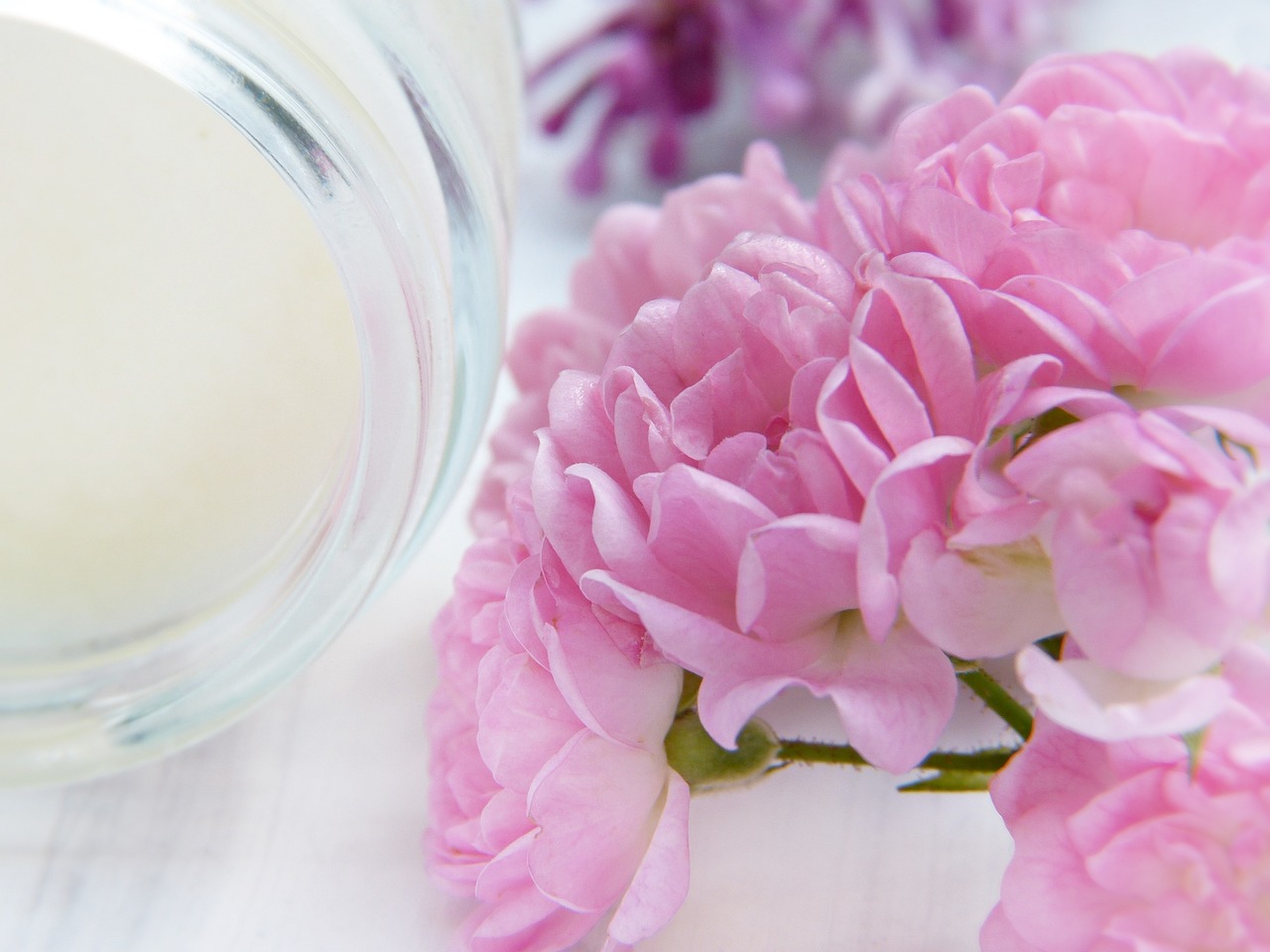
Understanding Senior Pet Skin Needs
As our beloved pets age, their skin can become a bit like an old, worn-out book—fading, fragile, and in need of special care. Just like we notice changes in our skin as we grow older, senior pets experience a variety of transformations that can affect their overall well-being. One of the most significant changes is the reduction in natural oils, which can lead to dryness and irritation. This is why understanding these changes is crucial for every pet owner. By recognizing the signs of aging skin, you can take proactive steps to ensure your furry friend remains comfortable and healthy.
Senior pets often face issues such as thinning fur, increased sensitivity, and a higher susceptibility to skin infections. Just think of their skin as a protective barrier that becomes less effective over time. This makes it essential to monitor for any signs of discomfort, such as excessive scratching or licking. If you notice these behaviors, it could be a cry for help from your pet. Regular veterinary check-ups can also help identify potential problems before they become serious.
Additionally, the environment plays a significant role in the health of your senior pet's skin. Factors such as seasonal changes, humidity levels, and allergens can all contribute to skin issues. For example, during the winter months, the dry air can exacerbate skin dryness, while summer may bring an increase in pests like fleas and ticks. Therefore, it’s vital to adapt your pet's care routine according to the season. Regularly checking your pet’s skin for any unusual bumps, redness, or changes in texture can catch problems early and allow for timely treatment.
Understanding the unique needs of senior pets is not just about observing their skin; it’s about creating a comprehensive care plan that includes proper nutrition, hydration, and grooming. By addressing these aspects, you can help your furry companion not only maintain a healthy coat but also enhance their overall quality of life. Remember, a little extra love and attention can go a long way in making your senior pet feel cherished and comfortable during their twilight years.
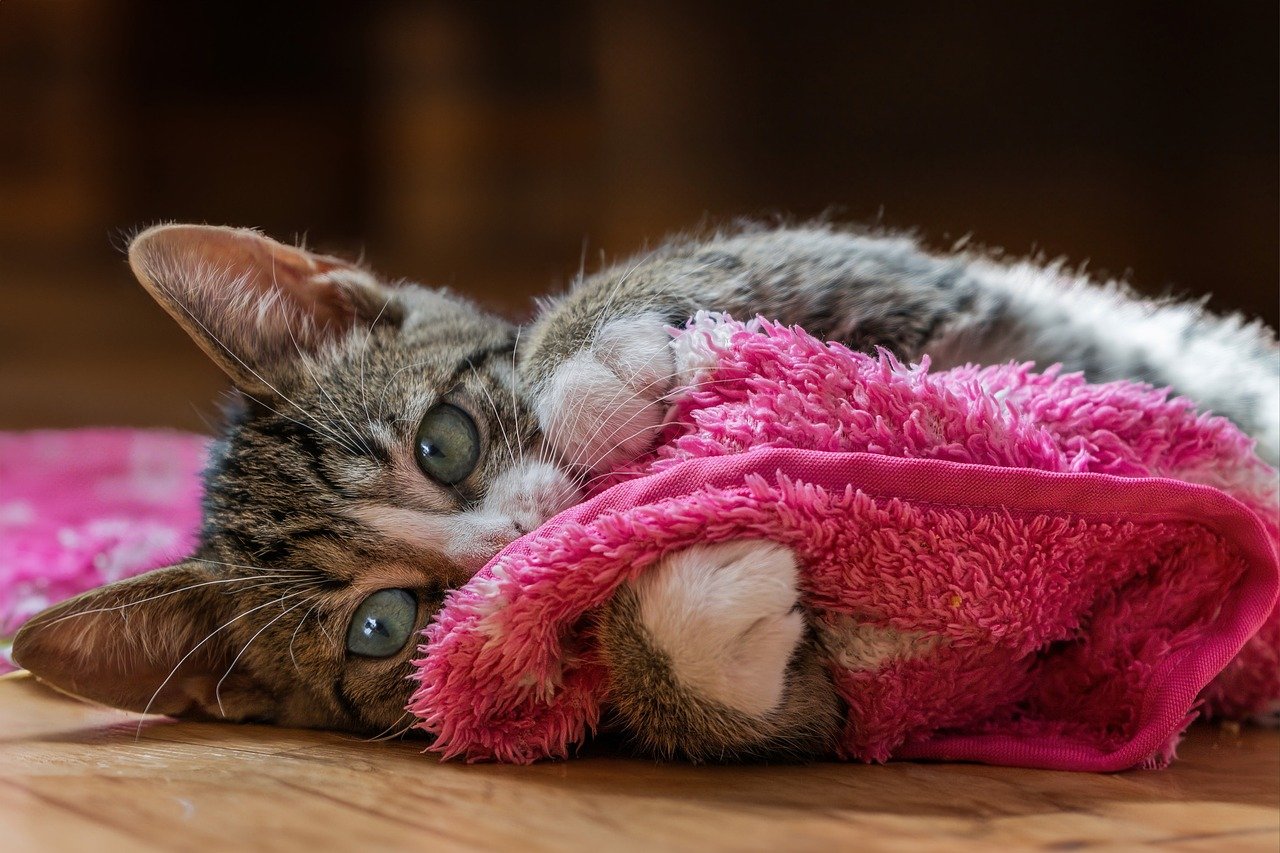
Nutrition for Healthy Skin and Coat
When it comes to our beloved senior pets, nutrition plays a pivotal role in maintaining their skin and coat health. Just like us, as pets age, their bodies require specific nutrients to combat the wear and tear of time. A well-balanced diet tailored to their unique needs can significantly enhance their skin's resilience and coat's shine. So, what should you be looking for in your senior pet's diet? Let's dive in!
First and foremost, it's essential to understand that senior pets often face different dietary needs compared to their younger counterparts. Their metabolism may slow down, and they might not require as many calories, but that doesn't mean they should skimp on vital nutrients. In fact, focusing on high-quality ingredients packed with essential vitamins and minerals can make all the difference. Think of their diet as a foundation—the stronger it is, the better their skin and coat will thrive.
Incorporating the right nutrients into your senior pet's meals is crucial. Here’s a snapshot of what to look for:
| Nutrient | Benefits | Sources |
|---|---|---|
| Omega-3 Fatty Acids | Reduces inflammation, improves skin hydration | Fish oil, flaxseed oil |
| Omega-6 Fatty Acids | Supports skin barrier function, promotes healthy coat | Corn oil, chicken fat |
| Vitamins A and E | Essential for skin repair and maintenance | Carrots, sweet potatoes, spinach |
| Zinc | Helps with skin healing and immune function | Meat, whole grains, legumes |
Now, let’s break it down further. Omega fatty acids are your pet's best friend when it comes to skin health. These essential fats help to keep the skin hydrated and can significantly reduce inflammation, making them a must-have in your senior pet's diet. Think of omega-3 and omega-6 fatty acids as the moisturizers of the nutritional world—essential for keeping that skin supple and healthy!
Next up are vitamins and minerals. Vitamins A and E are crucial players in skin repair and maintenance. They work together to help your pet's skin stay resilient against the elements. Zinc, on the other hand, is like a shield for your pet’s skin, aiding in healing and supporting their immune system. Including these nutrients in your pet's diet can be as simple as adding a few fresh veggies or choosing a high-quality pet food that lists these ingredients prominently.
Finally, let’s not forget about hydration! Just like we need to drink plenty of water to keep our skin looking its best, our senior pets do too. Ensuring that your furry friend stays hydrated is vital for maintaining skin elasticity and overall health. You can encourage your pet to drink more by:
- Providing fresh water daily
- Adding water or low-sodium broth to their food
- Offering ice cubes or frozen treats made from broth
In conclusion, a balanced diet rich in essential nutrients is the cornerstone of maintaining healthy skin and coat in senior pets. By focusing on high-quality ingredients and ensuring proper hydration, you can help your furry friend shine brightly in their golden years. Remember, you are what you eat, and that goes for our pets too!
Q: How often should I feed my senior pet?
A: It’s generally best to feed senior pets smaller, more frequent meals throughout the day to aid digestion and maintain energy levels.
Q: Can I give my senior pet human food?
A: Yes, but be cautious! Stick to pet-safe fruits and vegetables and avoid toxic foods like chocolate, onions, and grapes.
Q: What signs should I look for to know if my pet's diet is working?
A: Healthy skin should be free of excessive flakiness, redness, or irritation, and their coat should be shiny and smooth. If you notice changes, consult your vet.
Key Nutrients for Skin Health
When it comes to maintaining healthy skin and coat in our senior pets, it's essential to focus on the key nutrients that play a pivotal role in their overall skin health. As pets age, their bodies undergo various changes, and their nutritional needs evolve as well. Providing a diet rich in specific vitamins and fatty acids can make a significant difference in their skin condition, helping to prevent dryness, irritation, and other skin issues.
Among the most important nutrients are Omega-3 and Omega-6 fatty acids. These essential fats are known for their anti-inflammatory properties and their ability to maintain skin hydration. Omega-3 fatty acids, in particular, can help alleviate itchy skin and promote a shiny coat. You can find these beneficial fats in fish oil, flaxseed oil, and certain types of algae. Incorporating these into your senior pet's diet can be as simple as adding a few drops of fish oil to their meals or selecting a high-quality pet food that lists these ingredients.
Another crucial group of nutrients includes Vitamins A, E, and zinc. Vitamin A is vital for skin repair and regeneration, while Vitamin E serves as a powerful antioxidant that protects skin cells from damage. Zinc, on the other hand, is essential for maintaining skin integrity and supporting the healing process. To ensure your senior pet gets enough of these nutrients, consider including foods like sweet potatoes, carrots, spinach, and pumpkin, which are rich in Vitamin A. For Vitamin E and zinc, nuts, seeds, and whole grains can be excellent sources.
To summarize, a diet tailored to meet the specific needs of senior pets should include:
- Omega-3 and Omega-6 fatty acids
- Vitamins A, E, and Zinc
By focusing on these key nutrients, you can significantly enhance your senior pet's skin health, making their golden years much more comfortable and enjoyable. Remember, a well-nourished pet is a happy pet, and investing in their diet today can lead to a lifetime of healthy skin and a lustrous coat!
Omega Fatty Acids
When it comes to maintaining the health of your senior pet's skin and coat, are nothing short of a miracle worker. These essential fats, particularly Omega-3 and Omega-6, are crucial for keeping your furry friend's skin hydrated and their coat shiny. Just like how a well-oiled machine runs smoothly, Omega fatty acids ensure that your pet's skin remains supple and resilient against the challenges of aging.
As our pets grow older, their skin tends to become dry and less elastic, which can lead to discomfort and a host of skin issues. Incorporating Omega fatty acids into their diet can help combat these problems. For instance, Omega-3 fatty acids, found in fish oil and flaxseed oil, have powerful anti-inflammatory properties that can soothe irritated skin and reduce itchiness. On the other hand, Omega-6 fatty acids, present in vegetable oils and animal fats, help to strengthen the skin barrier, preventing moisture loss and keeping the skin hydrated.
Now, you might be wondering how to effectively incorporate these essential fats into your senior pet's diet. Here are a few tips:
- Choose high-quality pet food: Look for brands that specifically list Omega-3 and Omega-6 fatty acids in their ingredients. Foods enriched with fish oil or flaxseed are excellent choices.
- Consider supplements: If your pet's diet lacks sufficient Omega fatty acids, you might want to consider adding supplements. Fish oil capsules or liquid fish oil can be easily mixed into their food.
- Consult with your vet: Before making any significant changes to your pet's diet, it's always a good idea to consult your veterinarian. They can recommend the right dosages and sources of Omega fatty acids tailored to your pet's specific needs.
In summary, Omega fatty acids are a vital component of your senior pet's diet, providing essential benefits for skin hydration, inflammation reduction, and overall well-being. By ensuring your furry friend gets enough of these nutrients, you can help them maintain a healthy, vibrant coat that reflects their happy and active spirit.
Vitamins and Minerals
When it comes to keeping our senior pets feeling their best, play a pivotal role in maintaining their skin health. As pets age, their bodies may not absorb nutrients as efficiently as they once did, making it essential to provide them with the right dietary support. Among the most crucial vitamins for skin health are Vitamin A, Vitamin E, and zinc. These nutrients not only help in skin repair but also contribute to overall vitality.
Vitamin A is a powerhouse when it comes to skin health. It promotes cell production and helps maintain a healthy skin barrier, which is crucial for preventing dryness and irritation. You can find this vitamin in foods like liver, fish, and carrots. However, be cautious with the dosage, as too much Vitamin A can be harmful.
Next up is Vitamin E, known for its strong antioxidant properties. This vitamin helps combat oxidative stress and supports skin healing. It can also improve the skin's moisture levels, making it less prone to flakiness. Foods rich in Vitamin E include nuts, seeds, and leafy greens. Adding these to your senior pet's diet can significantly enhance their skin condition.
Lastly, zinc is another mineral that should not be overlooked. It plays a vital role in skin regeneration and helps maintain a healthy immune system. Zinc deficiency can lead to various skin issues, including hair loss and dermatitis. You can find zinc in meat, shellfish, and legumes, making it relatively easy to incorporate into your pet's meals.
In summary, ensuring your senior pet receives adequate amounts of these vitamins and minerals can make a world of difference in their skin health. Consider discussing dietary options with your veterinarian to tailor a meal plan that meets your pet's unique needs. Remember, a well-nourished pet is a happy pet!
- How often should I give my senior pet vitamins? It's best to consult your veterinarian for personalized advice based on your pet's specific needs.
- Can I give my pet human vitamins? No, human vitamins may contain ingredients that are harmful to pets. Always use pet-specific supplements.
- What are the signs of vitamin deficiency in pets? Look for symptoms such as dry skin, hair loss, and lethargy. If you notice these, consult your vet.
Hydration and Skin Health
When it comes to maintaining healthy skin and a lustrous coat in senior pets, hydration plays a pivotal role. Just like us, our furry friends need plenty of water to keep their skin supple and their coats shiny. As pets age, their bodies may not retain moisture as effectively as they once did, which can lead to dryness and discomfort. Imagine your pet's skin as a sponge; when it’s well-hydrated, it’s soft and pliable, but when it’s dry, it becomes hard and brittle. This analogy perfectly illustrates why ensuring your senior pet drinks enough water is crucial for their overall health.
Senior pets may be less inclined to drink water due to decreased activity levels or even health issues. It’s essential to monitor their water intake closely. You can encourage your pet to drink more fluids by:
- Providing fresh, clean water at all times.
- Using a pet water fountain, which often encourages drinking due to the flowing water.
- Adding water or low-sodium broth to their food to increase moisture intake.
- Offering ice cubes as a treat; some pets love playing with and licking them!
Additionally, you can incorporate hydrating foods into their diet. Foods with high water content, such as cucumbers or watermelon (without seeds), can be a delightful way to boost hydration. Just be sure to introduce any new foods gradually and consult with your vet to ensure they’re safe for your pet.
To further emphasize the importance of hydration, consider the following table that outlines the benefits of proper hydration for senior pets:
| Benefit | Description |
|---|---|
| Skin Elasticity | Well-hydrated skin maintains its elasticity, reducing the risk of cracks and irritations. |
| Coat Shine | Adequate hydration contributes to a shiny, healthy coat that’s less prone to matting. |
| Overall Health | Proper hydration supports vital organ functions, which is crucial for senior pets. |
In summary, hydration is not just about quenching thirst; it’s about maintaining the overall health and vitality of your senior pet. By ensuring they have access to fresh water and incorporating hydrating foods into their diet, you can help them enjoy their golden years with a healthy, happy skin and coat.
Here are some common questions pet owners have regarding hydration and skin health in senior pets:
- How much water should my senior pet drink daily? A general guideline is about 1 ounce of water per pound of body weight, but this can vary based on factors like diet and activity level.
- What signs indicate my pet is dehydrated? Look for symptoms like dry gums, lethargy, and decreased skin elasticity. If you pinch the skin and it doesn’t bounce back quickly, that’s a sign of dehydration.
- Can I give my pet flavored water? Yes, but ensure it’s low in sodium and free from artificial sweeteners or harmful ingredients. Always consult your vet before introducing anything new.

Grooming Practices for Senior Pets
When it comes to our beloved senior pets, grooming is not just about aesthetics; it's a crucial aspect of their overall health and well-being. As pets age, their skin and coat can become more delicate and prone to various issues. Regular grooming helps to maintain their skin's health, promotes circulation, and allows you to keep an eye on any changes that may need veterinary attention. Think of grooming as a spa day for your furry friend—it's a time for bonding, care, and ensuring they feel their best!
One of the most important elements of grooming is bath frequency. While we all want our pets to smell fresh, bathing them too often can strip away the natural oils that keep their skin hydrated. For senior pets, a good rule of thumb is to bathe them every 4 to 6 weeks, unless they get particularly dirty. When you do bathe them, opt for gentle, moisturizing shampoos specifically designed for senior pets. These shampoos help maintain the skin's natural moisture balance, which is essential as their skin tends to dry out more easily.
Another key grooming practice is brushing. Regular brushing not only removes dead hair and dirt but also stimulates the skin and promotes blood circulation. For senior pets, this can be particularly beneficial as it helps keep their skin healthy and can even alleviate some discomfort from conditions like arthritis. Depending on your pet's coat type, you may need to choose different brushes:
| Coat Type | Recommended Brush | Brushing Frequency |
|---|---|---|
| Short Hair | Slicker Brush or Rubber Brush | Weekly |
| Medium Hair | Pin Brush | Every Few Days |
| Long Hair | Wide-Toothed Comb and Pin Brush | Daily |
In addition to brushing and bathing, keeping an eye on your senior pet's nails is essential. Overgrown nails can cause discomfort and lead to mobility issues. Aim to trim their nails every 3 to 4 weeks, or as needed. If you're unsure how to do this safely, consider asking your veterinarian or a professional groomer for guidance.
Finally, don't forget the importance of ear and dental care. Senior pets are more susceptible to ear infections and dental issues, so regular checks and cleanings are vital. Gently wipe the inside of their ears with a damp cloth and use vet-approved dental treats or brushes to keep their teeth clean. This not only helps maintain their hygiene but also contributes to their overall health.
In summary, grooming practices for senior pets are essential for their comfort and health. By establishing a regular grooming routine that includes bathing, brushing, nail trimming, and ear and dental care, you can help ensure your furry friend enjoys their golden years with a healthy, shiny coat and happy skin!
- How often should I groom my senior pet? Regular grooming should be done at least once a week, with baths every 4 to 6 weeks.
- What type of shampoo is best for senior pets? Look for gentle, moisturizing shampoos specifically formulated for older pets.
- Can I use human shampoo on my pet? It's best to avoid using human shampoo, as it can disrupt the pH balance of your pet's skin.
- How do I know if my pet's skin is healthy? Look for signs like a shiny coat, no excessive flaking, and no signs of irritation or redness.
Bathing Techniques
Bathing your senior pet is not just about keeping them clean; it's an essential part of their overall skin health. However, as pets age, their skin becomes more sensitive and can easily lose its natural oils. This makes it crucial to adopt the right bathing techniques to ensure your furry friend enjoys bath time without any adverse effects. So, how often should you bathe your senior pet? Generally, it’s advisable to bathe them every 4 to 6 weeks, but this can vary based on their activity level and the environment they live in. If your pet tends to get dirty more often, consider a gentle wipe-down instead of a full bath.
When selecting a shampoo, look for products specifically formulated for senior pets. These shampoos are typically milder and designed to preserve the natural oils in the skin. Ingredients like oatmeal, aloe vera, and chamomile can be soothing for older pets, helping to alleviate any irritation they may experience. Avoid human shampoos, as they can disrupt the pH balance of your pet's skin and lead to dryness or irritation.
Before you start the bathing process, prepare everything you need within arm's reach. This includes the shampoo, towels, and a non-slip mat to prevent your pet from slipping in the tub or shower. A gentle approach is key; consider using lukewarm water to make the experience more comfortable for your pet. As you wet their coat, be cautious around their eyes and ears to avoid discomfort. Use a cup or a handheld showerhead to rinse thoroughly, ensuring that no shampoo residue remains, as this can lead to skin issues.
After bathing, it’s essential to dry your pet properly. Use a soft towel to gently pat them dry, and if your pet tolerates it, a low-heat blow dryer can be used on the cool setting. Always keep the dryer at a safe distance to avoid overheating their skin. Remember, a well-groomed pet is a happy pet, and maintaining a routine will not only keep their skin healthy but also strengthen the bond between you and your furry companion.
- How often should I bathe my senior pet? It's generally recommended to bathe senior pets every 4 to 6 weeks, but this can vary based on their individual needs.
- Can I use human shampoo on my pet? No, human shampoos can disrupt the pH balance of your pet's skin and may cause irritation. Always opt for pet-specific shampoos.
- What should I do if my pet doesn't like baths? Try to make the experience more enjoyable by using treats and praise, or consider using a damp cloth for a quick clean instead of a full bath.
Brushing and Coat Maintenance
When it comes to for senior pets, it's not just about aesthetics; it's a crucial part of their overall health. As pets age, their skin becomes more sensitive, and their coats can become thinner and less resilient. Regular brushing helps to remove dead hair, dirt, and debris, but it also stimulates blood circulation, which is vital for keeping their skin healthy. Think of brushing as a gentle massage that not only feels good but also promotes skin health.
For senior pets, the frequency and technique of brushing can make a significant difference. While younger pets may tolerate more vigorous grooming, older pets often require a softer touch. Aim to brush your senior pet at least once a week, or more often if they have a longer coat. Use a brush that is appropriate for their coat type—whether it’s a slicker brush for long-haired breeds or a bristle brush for short-haired ones. The goal is to be gentle; you want to avoid causing any discomfort or irritation.
It's also essential to pay attention to specific areas that may need extra care. For example, the belly, underarms, and behind the ears are common spots where mats can form. When you encounter a mat, resist the urge to pull it out forcefully. Instead, use a detangling spray to help loosen it, and carefully work it out with your fingers or a comb. This approach minimizes pain and stress for your senior pet.
Additionally, consider the following tips for effective brushing and coat maintenance:
- Choose the Right Time: Pick a quiet time when your pet is relaxed, perhaps after a walk or a meal. This can make the experience more enjoyable for both of you.
- Use Treats: Reward your pet with treats during and after brushing sessions. This positive reinforcement can help them associate grooming with something pleasant.
- Monitor Skin Health: While brushing, take the opportunity to check for any unusual lumps, bumps, or skin irritations. Early detection can lead to better outcomes.
Incorporating brushing into your senior pet’s routine not only helps maintain their coat but also strengthens the bond between you and your furry friend. It’s a time to connect, to show love, and to ensure that they are comfortable in their own skin. Remember, a well-groomed pet is a happy pet!
Q: How often should I brush my senior pet?
A: Ideally, you should brush your senior pet at least once a week, but more frequent brushing may be needed for pets with longer coats.
Q: What type of brush is best for my senior pet?
A: The type of brush depends on your pet's coat type. Slicker brushes work well for long-haired pets, while bristle brushes are best for short-haired breeds.
Q: How can I make brushing more enjoyable for my pet?
A: Choose a calm time for brushing, use treats as rewards, and be gentle. Building a positive association with grooming can help your pet enjoy the process.
Q: What should I do if I find mats in my pet's coat?
A: Use a detangling spray to loosen the mat and carefully work it out with your fingers or a comb. Avoid pulling to reduce discomfort.
Frequently Asked Questions
-
What changes occur in the skin of senior pets?
As pets age, their skin can become thinner, drier, and less elastic. This can lead to issues like increased sensitivity, dryness, and a higher susceptibility to infections. Understanding these changes is essential for providing the right care.
-
How can I improve my senior pet's diet for better skin health?
Incorporating key nutrients such as Omega-3 and Omega-6 fatty acids, as well as vitamins A and E, can significantly enhance your pet's skin health. Look for high-quality pet foods that list these ingredients or consider supplements if necessary.
-
How important is hydration for my senior pet?
Hydration is crucial for maintaining skin elasticity and overall health. Ensure your pet has constant access to fresh water and consider adding wet food to their diet to boost fluid intake.
-
What grooming practices should I adopt for my senior pet?
Regular grooming is vital for senior pets. Aim to brush their coat at least once a week to remove dead hair and dirt, and to stimulate circulation. Pay special attention to areas prone to matting and tangling.
-
How often should I bathe my senior pet?
Bathing should be done sparingly to avoid stripping the skin of essential oils. Generally, once every month or two is sufficient, unless your pet gets particularly dirty. Use gentle, moisturizing shampoos designed for senior pets.
-
What should I do if I notice skin issues in my senior pet?
If you observe any unusual signs such as excessive itching, redness, or sores, it’s essential to consult your veterinarian. They can diagnose potential skin conditions and recommend appropriate treatments.



